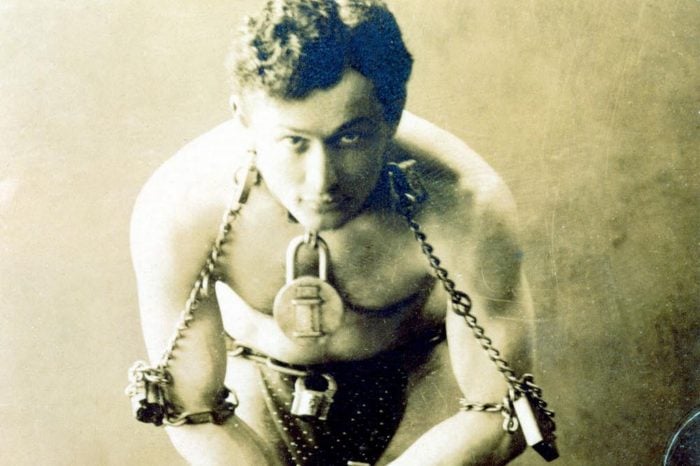“…I want to be first, I vehemently want to be first…So, I have struggled and fought. I have done and abstained; I have tortured my body and risked my life only for that- to have one plank on the stage where the imitators cannot come, and one spot where they all fall back and cry, ‘Master!’” ~ Harry Houdini
While working on an article concerning male body image, I came across the above Harry Houdini quote.
It certainly spoke to body dysmorphia and performance-based mindsets. But I also saw, within the quote, a strong connection to the “why” of narcissistic behavior.
Yes, as I looked a little closer at the quote, breaking it down, I could see the blueprint, perhaps of narcissistic behavioral choices.
They want to be first because they’ve often felt last.
“I want to be first, I vehemently want to be first…”
Look at the beginning of Houdini’s statement. There’s nothing wishy-washy here. “First” is the objective—vehemently, in fact. Narcissists want that first place of distinction, power, and its perks, because, often through some personal wounding like childhood abuse or trauma, they have felt dead last when it comes to their importance.
It’s cliché, but still all too true. The driving “I’ll show them!” need compels them to enact vengeance and wield power, in what is possibly an attempt to erase all memory and experience of being a victim. They determine that being first will heal their lives.
They are fighters.
“So, I have struggled and fought. I have done and abstained…”
Narcissists are fighters who feel they have much to prove. There is no passivity to them. Sometimes, it looks like they may be all about a peaceful way of being. But look a little closer and you may find passive-aggressive behavior to be in place of authentic peacefulness.
Regardless, narcissists will fight and be Machiavellian in their approach to obtain what they desire. They are terrified and disdainful of the quiet contemplation and stillness that would better serve them, and provide them insight; they’re not interested in that.
Narcissists are action-oriented. They want their results. Period. And unfortunately, that action may mean harm to the rest of us.
They sacrifice to justify their ends.
“I have tortured my body and risked my life…”
Again, we’re back to the Machiavellian nature. The ends justify the means. Narcissists risk themselves and others. If there is something they want, anything and anyone is expendable.
Narcissists are risk-takers and they often do not discriminate between people, principles, and behaviors. They will do whatever they feel they need to do. Morality, ethics, and compassion pale in the face of “results.” Therefore, if a person, marriage, business, relationship, or mental, emotional, and physical well-being need to be sacrificed, then so be it. They will even risk their own lives, knowingly or unknowingly, via careless, reckless, and dangerous behaviors.
Narcissists have a rigid definition of what reward or success.
“…only for that…”
And they will not change their minds. It’s about the bigger, better deal.
Narcissists are often blinded by their passions and their goals. “Aspirational” is an understatement of a word to describe their mentality. Nothing must get in the way of achieving them.
Indeed, achievements, power, image, and material possessions are all more important than people, morality, and integrity. Most narcissists are horrible at relationships. Yes, they can charm people. Yes, they can manipulate. But intimacy and honestly connecting one-on-one is not sustainable—probably largely because intimacy is not the priority.
Narcissists, in fact, often see intimacy and vulnerability as weakness. Likewise, many of them view human relationships and things, as tools—mere devices—to get what they truly desire in life: the power, the wealth, the fame, the status.
They assert, “…only for that”
They believe in the power of the payoff.
“…to have one plank on the stage where the imitators cannot come, and one spot where they all fall back and cry, ‘Master!’”
Payoff is the end-all, be-all point to anything and anyone many narcissists pursue. Synonymous with that payoff, much of the time, is mastery, dominion, authority, power, and control. Of course, obtaining these things can often position one in a place of admiration, adulation, and intimidating awe.
In one way or another, a convincing argument is asserted by the narcissist, in which “…they all fall back and cry, ‘Master!’” And this is where a harmful lie is endorsed, both by the narcissist and by the person or people who perpetrate it: a certain person is better or worse than another. Hierarchy. We now have the tiered system of human value and worth at work, all based on whether or not any individual is, indeed, “Master.”
Think we’re too intelligent to fall for such a lie? I give you one word: celebrity.
Movies, television, and reality shows, magazines, and all sorts of media and attention-seeking outlets are devoted to worshipping these individuals as “better”—as “Master.”But it spreads beyond the world of fame. This principle can play out in our ordinary, mundane lives.
Narcissism plays out because we, as human beings, have the capacity to believe anything about another person. We can believe the truth; we can believe the lie. We can believe there are people out there who are more important than we are. We can believe we don’t measure up, in any given capacity. We can believe “mastery” is attainable and that it excuses forms of exploitation and abuse. Narcissists often take these factors and run with them.
They are intoxicated by the lure of power, as well as the ease it so often exists as many of us are already too willing to do most of their work for them. If we readily subscribe to value estimates of less than or more than—if we give credence to human hierarchy—then there’s little left for the narcissist to do but claim themselves as “Master.” No one challenges it; no one dares challenge it. It’s simply understood as fact, law, decree, truth.
Is it worth it?
Houdini’s last words before dying were, reportedly, “I’m tired of fighting… I do not want to fight anymore.”
Let that sink in for a moment.
All of us have the capability to exhibit narcissistic tendencies. Some of us have full-blown Narcissistic Personality Disorder, while others fall on varying degrees of the spectrum. Each of us can be self-indulgent, self-obsessed, and self-absorbed.
We like being first in line. Some of us like to fight. Some of us can be myopic about sacrifice for the sake of a greater goal. And yes, unflattering as it is, we can also have the tendency to forget another person’s humanity and only see them as objects or a means to an end.
We want to be in control and feel our own sense of mastery and power in life. Before we point a finger at our designated villain narcissist, it would probably be helpful to do a little self-reflection of our own.
When was the last time we let out our own narcissistic cry, in thought, word, or deed? How then do we respond to our answer in thought, word, or deed?
~











Read 0 comments and reply